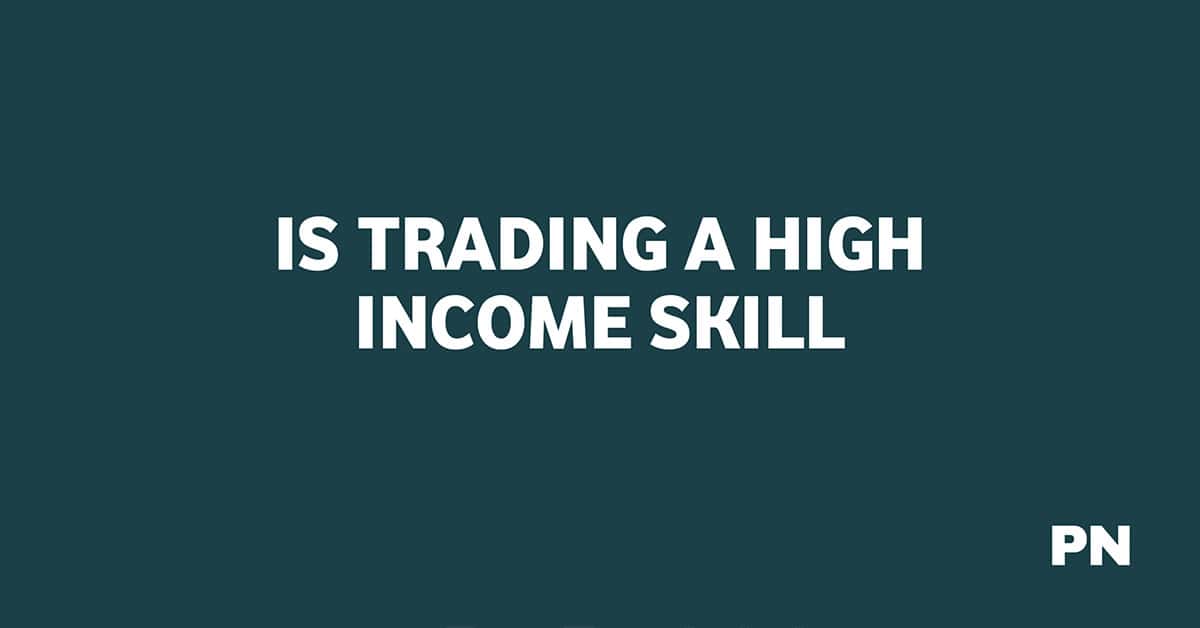Is Trading a High-Income Skill? (Yes, See Why)

If you want to increase your earning potential, you may have heard that trading is a high-income skill. But is it? The answer may surprise you.
Contrary to popular belief, trading is not a guaranteed path to riches. In fact, many traders lose money and fail to make a living from it.
While some successful traders earn high incomes, it’s important to understand that trading requires significant knowledge, skill, and discipline. It’s not a get-rich-quick scheme.
What is Trading Really About?
Trading is buying and selling financial instruments such as stocks, bonds, currencies, and commodities to make a profit. It is a highly complex and competitive field that requires a specific set of technical and soft skills.
To be successful in trading, you need a good understanding of the financial markets, the ability to analyze and interpret data, and technical skills such as chart reading, risk management, and trade execution.
However, trading is not just about technical skills.
Soft skills such as discipline, patience, and emotional control are equally important. Many traders fail not because they lack technical skills but because they lack the emotional intelligence to handle the market’s ups and downs.
Is Trading a High-Income Skill?

Trading can potentially be a high-income skill for individuals with the knowledge, experience, discipline, and ability to make profitable trades in financial markets consistently.
However, it’s important to note that trading also involves significant risks, and not everyone who attempts it will achieve high income or success.
Successful trading requires a deep understanding of market dynamics, technical and fundamental analysis, risk management, and emotional control. Traders must adapt to changing market conditions, develop effective trading strategies, and manage their positions effectively to minimize losses and maximize profits.
Factors that Affect Trading Income
Trading can be a high-income skill if done correctly. However, several factors affect how much you can earn from trading.
These include:
- Experience: The more experience you have in trading, the better your chances of making a profit. Experienced traders are better equipped to analyze market trends and make informed decisions.
- Market conditions: The state of the market can also affect how much you can earn from trading. In a volatile market, there is a higher chance of making a profit but a higher risk of losing money.
- Trading strategy: Your trading strategy can also affect your income. A well-planned and executed strategy can lead to higher profits, while a poorly planned one can lead to losses.
Pros and Cons of Trading as a High-Income Skill
Here are some pros and cons to consider:
Pros:
Flexibility: Trading can be done from anywhere, as long as you have an internet connection. This makes it a convenient way to earn additional income.
High earning potential: With the right strategy and experience, trading can be a lucrative way to earn money.
Independence: Trading is a solo activity, which means you have complete control over your decisions and actions.
Cons:
High risk: Trading involves a high degree of risk. There is no guarantee that you will profit, and you could lose money.
Time-consuming: Trading requires a significant amount of time and effort. You must stay up-to-date with market trends and news and be prepared to act quickly when necessary.
Emotional strain: Trading can be stressful, especially when dealing with large sums of money. It can also be emotionally draining, as losses can damage mental health.
Type of Traders & Which Should You Learn/Join?
There are several types of trading, each with its characteristics and strategies. Here are some of the main types:
- Day Trading:
Day traders buy and sell financial instruments within the same day, aiming to capitalize on short-term price movements. They typically close out all positions before the market closes to avoid overnight risks.
- Swing Trading:
Swing traders hold positions for a few days to weeks, aiming to profit from short- to medium-term price fluctuations. They often use technical analysis to identify potential entry and exit points.
- Position Trading:
Position traders hold positions for weeks, months, or even years based on long-term trends and fundamentals. They typically have a more relaxed trading style and focus on major market movements.
- Scalping:
Scalpers aim to profit from small price movements by executing many trades quickly. They typically hold positions for seconds to minutes and rely on quick execution and tight spreads.
- Algorithmic Trading:
Also known as automated trading or algo trading, this involves using computer algorithms to execute trades automatically based on predefined criteria. Algorithmic traders often employ complex strategies and rely on high-speed data feeds for execution.
- Options Trading:
Options trading involves buying and selling options contracts, which give the holder the right (but not the obligation) to buy or sell an underlying asset at a specified price within a certain timeframe. Options can be used for speculation, hedging, or income generation.
- Forex Trading:
Forex, or foreign exchange, trading involves buying and selling currencies in the foreign exchange market. Traders aim to profit from fluctuations in exchange rates between currency pairs.
- Cryptocurrency Trading:
Cryptocurrency trading involves buying and selling digital currencies like Bitcoin, Ethereum, etc. Traders speculate on price movements in these highly volatile markets.
Which Should You Learn?
Determining which type of trading to learn depends on various factors, including your interests, skills, risk tolerance, and resources.
Here’s a breakdown of a few options:
Day Trading: Day trading can be profitable if you have the time to monitor the markets closely and make quick decisions. However, it requires a significant time commitment and can be stressful, especially for beginners. Success in day trading often depends on combining technical analysis skills, market knowledge, and discipline.
Swing Trading: Swing trading offers a balance between short-term and long-term trading. It allows for more flexibility in time commitment compared to day trading, as trades are typically held for several days to weeks. Swing traders can take advantage of medium-term price trends and may find it less stressful than day trading.
Position Trading: Position trading suits those with a longer-term outlook who prefer to focus on major market trends and fundamentals. It requires less active monitoring than day or swing trading, making it suitable for individuals with limited time availability. However, position trading requires patience and the ability to withstand market fluctuations over longer timeframes.
Options Trading: Options trading can offer significant profit potential but involves complex strategies and higher risk. Learning options trading requires a good understanding of derivatives markets and the ability to analyze various factors influencing options prices, such as volatility and time decay.
Forex or Cryptocurrency Trading: Forex and cryptocurrency trading can be lucrative but highly volatile and speculative. Success in these markets often requires a deep understanding of global economic factors, technical analysis, and risk management. Additionally, the 24/7 nature of cryptocurrency markets may require constant monitoring.
In terms of profitability and ease for beginners, swing trading or position trading may be more suitable options. These approaches typically involve holding trades for longer periods, allowing for more relaxed decision-making and less stress than day trading.
How Do Traders Make Money?
To profit in trading, you need to buy low and sell high. This means you need to buy an asset at a lower price and sell it at a higher price. The difference between the buying and selling price is your profit.
Traders can make money through capital appreciation and dividends.
Capital appreciation occurs when the value of an asset increases, and you can sell it for a higher price than you bought it. Dividends are payments made by companies to their shareholders.
When you trade stocks, you can make money by buying low and selling high or short selling. Short selling is when you borrow and sell shares from someone else, hoping to buy them back at a lower price and make a profit.
Forex traders make money by buying a currency at a lower price and selling it at a higher price. This is called going long. They can also make money by selling a currency at a higher price and buying it back at a lower price. This is called going short.
Commodity traders make money by buying commodities at a lower price and selling them at a higher price. They can also make money by short-selling commodities.
Where Can I Find High-Paying Trading Jobs?
If you are interested in pursuing a career in trading, various options are available. Trading jobs can be found in a number of industries, including finance, commodities, and foreign exchange.
Here are a few places you can look for high-paying trading jobs:
Investment Banks
Investment banks are among the most common places to find high-paying trading jobs. These banks typically have large trading desks that deal in various financial instruments, including stocks, bonds, and derivatives.
Investment banks are known for their high salaries and bonuses, making them an attractive option for those looking to make a lot of money in the trading industry.
Hedge Funds
Hedge funds are another option for those looking for high-paying trading jobs.
These funds typically invest in various assets, including stocks, bonds, and commodities. Hedge funds are known for their high-risk, high-reward strategies, so they often pay their traders very well.
Proprietary Trading Firms
Proprietary trading firms are another option for those looking for high-paying trading jobs. These firms typically trade using their capital rather than client funds. They often have a more relaxed work environment than investment banks or hedge funds and may offer more flexibility regarding trading strategies.
Commodity Trading Firms
Commodity trading firms are another option for those looking for high-paying trading jobs. These firms specialize in trading oil, gas, and metals. Commodity trading firms often have a more specialized focus than other types of trading firms, and as a result, they may offer higher salaries and bonuses to attract top talent.
Wrapping Up
In conclusion, day trading can be a high-income skill if done correctly. It requires a lot of discipline, research, and market knowledge. It is important to have a well-thought-out trading strategy and to stick to it.
While day trading can be lucrative, it is important to note that it also comes with risks. You should manage your risk and not invest more than you can afford to lose.
Many resources are available online if you are interested in learning how to day trade. Before investing real money, you can take courses, read books, and practice with a demo account.
Remember, day trading is not a get-rich-quick scheme. It takes time and effort to develop the necessary skills and knowledge. With patience and discipline, however, it can be a profitable venture.
Here are some key takeaways to keep in mind:
- Day trading can be a high-income skill if done correctly
- It requires discipline, research, and knowledge of the market
- It comes with risks, so it is important to manage your risk and not invest more than you can afford to lose
- There are many resources available online to help you learn how to day trade
- Developing the necessary skills and knowledge takes time and effort, but with patience and discipline, it can be a profitable venture.
Disclosure: We may earn commissions if you buy via links on our website. Commissions don’t affect our opinions or evaluations. We’re also an independent affiliate of many platforms, including ClickFunnels, Kartra, GoHighLevel, Podia, Northwest Registered Agent, and others. We’re not employees of these services. We receive referral payments from them, and the opinions expressed here are our own and are not official statements of these companies.





